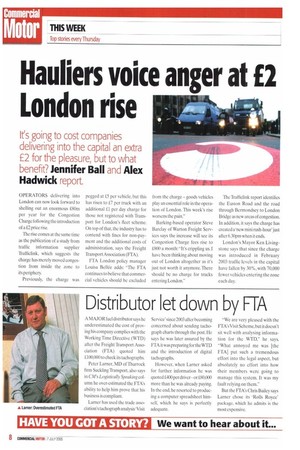Hauliers voice anger at E2 London rise
Page 8

If you've noticed an error in this article please click here to report it so we can fix it.
It's going to cost companies delivering into the capital an extra
£2 for the pleasure, but to what benefit? Jennifer Ball and Alex Hadwick report.
OPERATORS delivering into London can now look forward to shelling out an enormous £80m per year for the Congestion Charge following the introduction of a /2 price rise.
The rise comes at the same time as the publication of a study from traffic information supplier Trafficlink, which suggests the charge has merely moved congestion from inside the zone to its periphery.
Previously, the charge was pegged at £5 per vehicle, but this has risen to £7 per truck with an additional £1 per day charge for those not registered with Transport for London's fleet scheme. On top of that, the industry has to contend with fines for non-payment and the additional costs of administration, says the Freight Transport Association (FTA).
FTA London policy manager Louisa Bell& adds: -The FTA continues to believe that commercial vehicles should be excluded from the charge — goods vehicles play an essential role in the operation of London. This week's rise worsens the pain."
Barking-based operator Steve Barclay of Warton Freight Services says the increase will see its Congestion Charge fees rise to £800 a month: "It's crippling us. I have been thinking about moving out of London altogether as it's just not worth it anymore. There should be no charge for trucks entering London." The Trafficlink report identifies the Euston Road and the road through Bermondsey to London Bridge as new areas of congestion. In addition, it says the charge has created a 'new mini rush-hour' just after 6.30pm when it ends.
London's Mayor Ken Livingstone says that since the charge was introduced in February 2003 traffic levels in the capital have fallen by 30%, with 70,000 fewer vehicles entering the zone each day.










































































































































































































